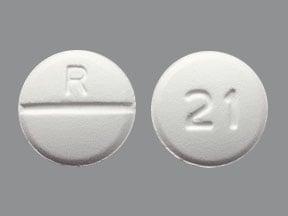
Labetalol Coupons & Savings Card – Discount Prices from $9.34
Labetalol is a medication prescribed to manage high blood pressure, either on its own or alongside other treatments. Effectively reducing blood pressure is crucial in preventing serious health issues such as strokes, heart attacks, and kidney complications. Labetalol functions as both an alpha blocker and a beta blocker. It operates by inhibiting certain natural chemicals like epinephrine, which affects the heart and blood vessels. This action helps to lower heart rate and blood pressure, thereby reducing the heart's workload. While labetalol is not typically the first option for treating high blood pressure, except during pregnancy, it can be administered orally twice daily or intravenously by healthcare professionals in hospital settings for severe cases. Some patients may experience side effects such as dizziness and fatigue. Currently, labetalol is available only in its generic form, as the brand name Trandate is no longer on the market. Always consult with healthcare providers for advice tailored to your health needs.
Our coupons are free to use. Before paying, show the pharmacist your Labetalol savings card to get your free discount. Use our filters below to edit the prescription box to match your needs. The Labetalol prices will update based on your prescription needs. Above our Labetalol coupons, you can change your location to see pharmacy prices and costs in other areas. We're here to help you buy Labetalol at the lowest price with our prescription discount card.
My prescription
Edit
100MG, Labetalol (60 Tablets)
Select pharmacy

CVS
$20.77
COUPON PRICE
Walmart
$9.34
COUPON PRICE
Albertsons
$13.63
COUPON PRICE
Walgreens
$13.75
COUPON PRICELabetalol savings card
Show this card to your pharmacist
Walmart
$9.34
BIN
ID
PCN
GRP
019876
LH5C975C49
CHIPPO
LHX
Powered by
Labetalol is a medication prescribed to manage high blood pressure, either on its own or alongside other treatments. Effectively reducing blood pressure is crucial in preventing serious health issues such as strokes, heart attacks, and kidney complications. Labetalol functions as both an alpha blocker and a beta blocker. It operates by inhibiting certain natural chemicals like epinephrine, which affects the heart and blood vessels. This action helps to lower heart rate and blood pressure, thereby reducing the heart's workload. While labetalol is not typically the first option for treating high blood pressure, except during pregnancy, it can be administered orally twice daily or intravenously by healthcare professionals in hospital settings for severe cases. Some patients may experience side effects such as dizziness and fatigue. Currently, labetalol is available only in its generic form, as the brand name Trandate is no longer on the market. Always consult with healthcare providers for advice tailored to your health needs.
Our coupons are free to use. Before paying, show the pharmacist your Labetalol savings card to get your free discount. Use our filters below to edit the prescription box to match your needs. The Labetalol prices will update based on your prescription needs. Above our Labetalol coupons, you can change your location to see pharmacy prices and costs in other areas. We're here to help you buy Labetalol at the lowest price with our prescription discount card.
Related beta blockers prescriptions
More prescriptions for hypertension
coupons from$226.89Save 72%
coupons from$17.71Save 92%
coupons from$7.02Save 91%
coupons from$18.60Save 74%
coupons from$66.15Save 38%
coupons from$15.56Save 75%
coupons from$20.94Save 91%
coupons from$10.57Save 63%
Related beta blockers prescriptions
Istalol Save 86%coupons from $35.25
Betimol Save 66%coupons from $190.49
Bisoprolol Save 55%coupons from $30.01
Betaxolol Save 85%coupons from $46.29
Carteolol Save 80%coupons from $14.02
Tenormin Save 53%coupons from $17.11
Timoptic Save 37%coupons from $20.13
Corgard Save 61%coupons from $39.26
More prescriptions for hypertension
Coreg Cr Save 72%coupons from $226.89
Nifedipine ER Save 92%coupons from $17.71
Quinapril Save 91%coupons from $7.02
Spironolactone Save 74%coupons from $18.60
Acebutolol Save 38%coupons from $66.15
Benazepril Save 75%coupons from $15.56
Enalapril Save 91%coupons from $20.94
Lopressor Save 63%coupons from $10.57
Labetalol dosage forms
Use our Labetalol 100MG coupon with prices from $9.34 for 60 Tablets. You can also use our Labetalol 100MG coupon with prices from $2.61 for 1 Tablet. We have a Labetalol 100MG coupon with prices from $5.92 for 30 Tablets. You can use our Labetalol 100MG coupon with prices from $12.76 for 90 Tablets.
Dosage Quantity Price from Per unit 100MG 60 Tablets $9.34 $0.16 100MG 1 Tablet $2.61 $2.61 100MG 30 Tablets $5.92 $0.20 100MG 90 Tablets $12.76 $0.14 100MG 100 Tablets $13.90 $0.14 100MG 500 Tablets $46.90 $0.09 200MG 1 Tablet $2.67 $2.67 200MG 60 Tablets $12.48 $0.21 200MG 90 Tablets $17.47 $0.19 200MG 100 Tablets $19.13 $0.19
| Dosage | Quantity | Price from | Per unit |
|---|---|---|---|
| 100MG | 60 Tablets | $9.34 | $0.16 |
| 100MG | 1 Tablet | $2.61 | $2.61 |
| 100MG | 30 Tablets | $5.92 | $0.20 |
| 100MG | 90 Tablets | $12.76 | $0.14 |
| 100MG | 100 Tablets | $13.90 | $0.14 |
| 100MG | 500 Tablets | $46.90 | $0.09 |
| 200MG | 1 Tablet | $2.67 | $2.67 |
| 200MG | 60 Tablets | $12.48 | $0.21 |
| 200MG | 90 Tablets | $17.47 | $0.19 |
| 200MG | 100 Tablets | $19.13 | $0.19 |
| 200MG | 500 Tablets | $63.80 | $0.13 |
| 300MG | 1 Tablet | $2.72 | $2.72 |
| 300MG | 60 Tablets | $15.55 | $0.26 |
| 300MG | 90 Tablets | $22.07 | $0.24 |
| 300MG | 100 Tablets | $24.25 | $0.24 |
| 300MG | 180 Tablets | $45.70 | $0.25 |
| 300MG | 500 Tablets | $80.20 | $0.16 |
| 400MG | 30 Tablets | $39.92 | $1.33 |
| 400MG | 90 Tablets | $116.20 | $1.29 |
| 400MG | 100 Tablets | $127.08 | $1.27 |
